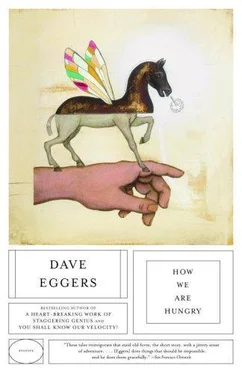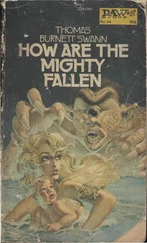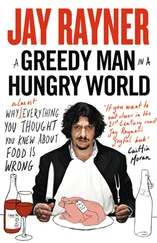Dave Eggers - How We Are Hungry
Здесь есть возможность читать онлайн «Dave Eggers - How We Are Hungry» весь текст электронной книги совершенно бесплатно (целиком полную версию без сокращений). В некоторых случаях можно слушать аудио, скачать через торрент в формате fb2 и присутствует краткое содержание. Год выпуска: 2005, Издательство: Vintage Canada, Жанр: Современная проза, на английском языке. Описание произведения, (предисловие) а так же отзывы посетителей доступны на портале библиотеки ЛибКат.
- Название:How We Are Hungry
- Автор:
- Издательство:Vintage Canada
- Жанр:
- Год:2005
- ISBN:нет данных
- Рейтинг книги:3 / 5. Голосов: 1
-
Избранное:Добавить в избранное
- Отзывы:
-
Ваша оценка:
- 60
- 1
- 2
- 3
- 4
- 5
How We Are Hungry: краткое содержание, описание и аннотация
Предлагаем к чтению аннотацию, описание, краткое содержание или предисловие (зависит от того, что написал сам автор книги «How We Are Hungry»). Если вы не нашли необходимую информацию о книге — напишите в комментариях, мы постараемся отыскать её.
A Heartbreaking Work of Staggering Genius
How We Are Hungry — читать онлайн бесплатно полную книгу (весь текст) целиком
Ниже представлен текст книги, разбитый по страницам. Система сохранения места последней прочитанной страницы, позволяет с удобством читать онлайн бесплатно книгу «How We Are Hungry», без необходимости каждый раз заново искать на чём Вы остановились. Поставьте закладку, и сможете в любой момент перейти на страницу, на которой закончили чтение.
Интервал:
Закладка:
The night is sharp, all the lights crisp, and Fish drives to the motel where Chuck said Adam had been staying. He’s supposed to pick up Adam’s things — four bags’ worth. Adam had been living there for a month, after he was asked to leave his halfway house for skinning a chicken in his room. That’s what Chuck said, at least. If Adam did indeed skin a chicken, he did it only to say he’d done it. “Ask for Mr. Ali,” Chuck said. Chuck handled logistics. He was Adam’s attorney, benefactor, medical historian. Fish was someone who could drive down and pick up bags.
When he gets to the motel, a women’s volleyball team is checking in. He waits for twenty minutes while they decide who will sleep in whose rooms, and which duffels will stay in the minibus. Fish reads every brochure the lobby offers, and makes a tentative plan to see the Museum of Irrigation.
When it’s his turn Fish asks for Mr. Ali, but the woman at the counter, heavy-lidded and wearing a maize-colored sari, says he’s gone. “I am Mrs. Ali. Yes please?” Fish shows her the letter that Chuck faxed, asking for Adam’s stuff. Chuck insisted on ending the letter with “I trust that this matter will not present a problem.” Every legal letter Chuck writes ends this way. He loses half of his cases.
Fish can see the bags just behind her, in a narrow hallway with a cement floor. Two clear plastic bags sit there, alert, and two tennis bags, one covered in mud. Mrs. Ali reads the note, then looks up at Fish. It’s then that he almost cries. Water seems to fill his forehead; his eyes are just portals that show he’s drowning. What is she looking at? How much does she know? She must know. The ambulance picked Adam up here, and she or her husband surely packed and stored his belongings. She knew Adam as a flailer, as a leaper, and now knows Fish as someone lesser, someone who picks up the bags of people like Adam. Fish is now among the people who live in motels and jump off motel roofs. There’s a highway just above the motel, and on it people are passing this place at eighty miles an hour, wondering what happens in the filthy world below.
“I have to call Mr. Ali,” she says, and does so, using a receiver larger than her face. She gets off the phone with Mr. Ali and lets Fish into the hallway behind the desk.
“Thanks,” he says on the way out.
“All right,” she says, opening the door for him. “Good!” she adds, and after he’s gone throws the bolt, right to left.
Fish loads the bags into his trunk, and then remembers what he wanted to investigate. He has forgotten to look until now, and is suddenly thrilled. He walks over to the courtyard area to see where Adam jumped. But he can’t find a part of the motel complex that has four stories. There is just the one two-story building, in an L shape around the pool, and its roof is only about eighteen feet high. Dumbshit! Fish has figured it out. Of course! Forty feet isn’t Adam’s way, after all, but eighteen feet is. He jumped from this. Dumbshit! Coward! Pissfuck! Who jumps eighteen feet? Who does this? This is so wrong. There are too many things wrong everywhere for this kind of thing, this jumping from eighteen-foot roofs. Adam must have known that eighteen feet wasn’t far enough to kill himself, just far enough to break bones. And the only thing sadder than an eighteen-foot motel roof is the guy staring at it.
He goes back to the car and opens the trunk. He reaches inside one of the plastic bags, looking for something solid. Most of its contents are soft, clothes, and here and there moist, but he soon finds a trophy, a small one with a tennis player on top and someone else’s name engraved on it. Elsewhere between the folds of shirts and socks there is some deodorant, a handful of tapes, which Fish pulls out for the drive home, and a bottle of cologne called Together, which makes him laugh. Adam is the only guy Fish knows who wears cologne. The only other items of note are five belts, wound as one like a rattlesnake, and a ten-pound container of baby powder.
And now a woman is walking across the lot toward Fish. Every part of her is moving — her ankles, unsteady in heels; her arms swinging; her head, which jitters with each step, as if it, too, played a part in her propulsion. Her features are mismatched — small chin, wide nose, the icy, almost clear eyes of a wolf. She’s wearing jeans and a denim jacket, with pointy blue velveteen boots and the streamlined, utilitarian body of a tomboy teenager.
“Hi,” she says.
“Hi,” Fish says.
“What’re you doing?” she asks. “Coming or going?”
She reminds him of the South somehow. He thinks of Kentucky and doesn’t know why. Is she nineteen or thirty? Fish can’t tell.
“I’m packing this stuff up,” he says.
“Then?”
“Then I’m driving down to see a friend.” It’s after ten and he hasn’t called Annie yet. If he calls too late she won’t let him come over.
“Can you give me a ride?” the woman says. “I’m trying to get to San Diego.”
“Oh. Yeah. See, I’m not going that far.”
Behind them, a truck parks and sighs.
“I can get out wherever you stop.”
He looks at her to see if she has a gun or a crowbar. He wants to help, but more than this, he wants to leave. Not long ago, at a gas station in Daly City, a tall man in a straw hat told Fish that he didn’t have any cash, and could Fish spot him twenty dollars — he’d give Fish a personal check in exchange. Fish figured he’d be less than human if he said no, so he said yes. The man had a car, after all, and was wearing a sports coat, so this was just a small transaction between solvent citizens. The guy put his home phone number on the check and everything. But the check bounced.
Fish had only wanted to help the man. He spent that first day thinking he had helped him, believing in the community of souls, in Daly City or anywhere. And then that man took it away. He reached inside Fish and took that from him.
Fish gets in the car and unlocks the passenger side. He moves a Jack in the Box bag and a milk carton and now the woman is sitting in the passenger seat, a few inches from him. She picks up the map from the floor, folds it quickly, expertly, and puts it in the side compartment.
“Thanks for this. You’re sweet,” she says, giving him her hand in a royal way. “What’s your name?”
“Eddie,” he says. Her hand is cold. He doesn’t know if he should kiss it or shake it. He doesn’t do either, just holds it for a few seconds and lets it drop.
“That’s weird,” she says. “My brother’s name is Eddie. Was.”
Now Fish considers giving her his real name. Instead, he says, “He changed his name?”
“No, he died.”
“Oh. I’m sorry.”
“No worries,” she says.
Fish pulls out of the parking lot and onto the frontage road. No worries. He wants to tell her how much he hates that expression, but doesn’t. “Don’t worry” makes sense, is a pat on the arm, a reassurance from one person to another, but “No worries” implies there aren’t any worries anywhere in the world, and that’s just not true.
They get on the highway. Fish asks her name. Her name is Wendy.
“Where’re you going?” she asks.
“Redondo Beach, I think.” That’s where Annie lives. Near the beach, with a futon, in a cave of an apartment next to the garage of a family of five. Her place is full of small glass figurines of mythical animals, ears pinched while the glass was molten— hippogriffs, hydras, satyrs, a tiny sphinx the color of cantaloupe.
“My ex lives in Redondo,” Wendy says. “He’s married now. She had four kids. Two of them Downies.”
“Huh,” Fish says. She is staring at him. He wonders how he looks in profile.
“So what were you doing at the motel?”
Читать дальшеИнтервал:
Закладка:
Похожие книги на «How We Are Hungry»
Представляем Вашему вниманию похожие книги на «How We Are Hungry» списком для выбора. Мы отобрали схожую по названию и смыслу литературу в надежде предоставить читателям больше вариантов отыскать новые, интересные, ещё непрочитанные произведения.
Обсуждение, отзывы о книге «How We Are Hungry» и просто собственные мнения читателей. Оставьте ваши комментарии, напишите, что Вы думаете о произведении, его смысле или главных героях. Укажите что конкретно понравилось, а что нет, и почему Вы так считаете.












